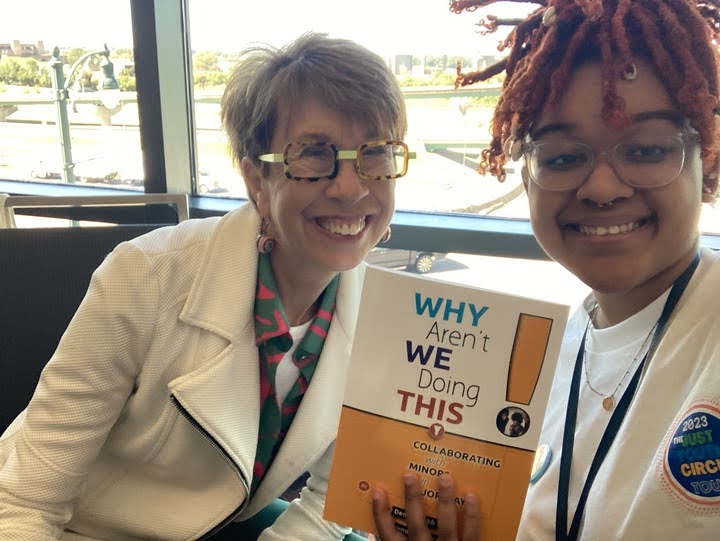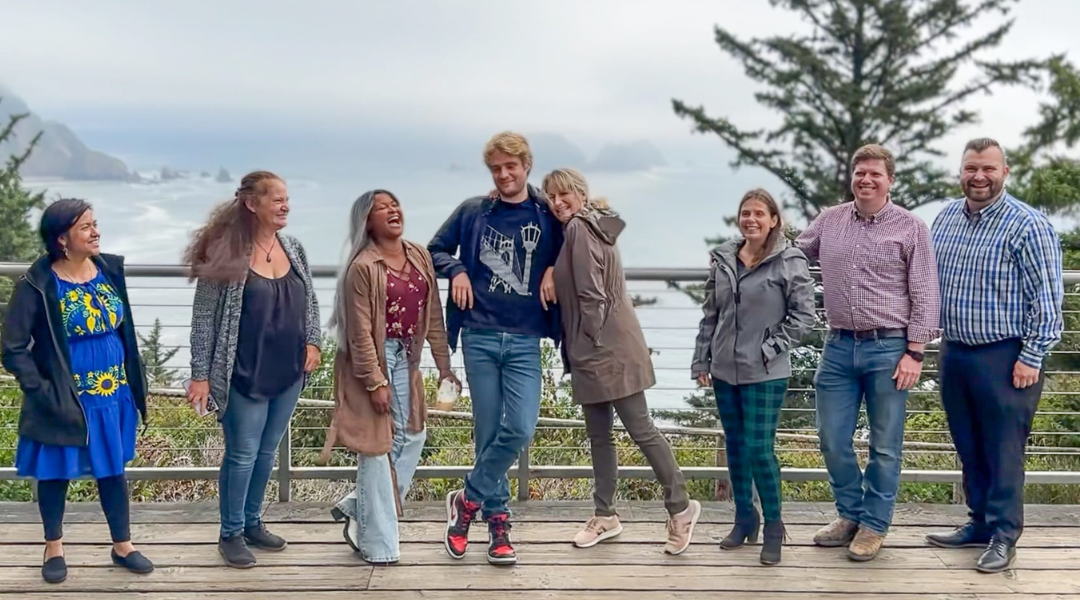
I was thrilled when I heard about the new book, Why Aren’t We Doing This! Collaborating with Minors in Major Ways, written by Denise Webb, age 20, and Wendy Schaetzel Lesko, age 73, (both pictured above) and published by Youth Infusion, a clearinghouse co-founded by Lesko. A whole book about cogeneration!
Why Aren’t We Doing This! advocates for “radical inclusion” of young people in the organizations, civic bodies and agencies that shape our society. It’s filled with young leaders’ voices, examples from organizations disrupting stereotypes, and practical ideas for inclusion that go way beyond token youth advisory boards.
Lesko, the co-founder of Youth Infusion and Youth Activism Project, is a veteran advocate for social change, intergenerational collaboration, and teen activism. She got her start working as a community organizer for the United Farm Workers Union in the 1970s. This is her sixth book.
Webb, a student at Berry College in Atlanta, has been an activist for the past five years, working with organizations including United Way, Partnership for Southern Equity and The Sunrise Movement. She is a Senior Fellow with CoGenerate.
I interviewed Webb and Lesko via Zoom. Below is a transcript of our conversation edited for length and clarity.
Why is this book needed now?
Denise: Young people’s views and life experiences need to be included in the decision making that affects our lives. When we aren’t, organizations that claim to be working with or on behalf of youth are instead tokenizing or manipulating us. In doing so, they are hurting those who are most impacted by the problems they want to solve. The young people that were going to be advocates and speakers are now too “burned” to speak up about the issues in their community, removing voices from future community engagement.
Wendy: We’re all missing out by continuing to perpetuate stereotypes like, “Oh kids these days, they’re screen-agers, they’re super predators. Let them wait.” When organizations say, “We’re not ready for you, and you’re not ready for us,” we all lose. We need to invite the uninvited to gain a wider lens, to see different perspectives and solutions.
How did you two meet?
Wendy: I called Denise as part of a round of 80 interviews I was doing with CEOs, managers and teen employees to learn more about interGEN collaboration. Denise told me she loves creative writing. Because she had five years of experience at age 19, I said, “Can we talk about co-authoring?” That’s sort of how this research bloomed into a book.
Denise: I remember being so startled because I randomly said, “Oh yeah I love creative writing,” and a few weeks later Wendy’s like, “Hey, do you want to co-author a book?” My heart sank and I was like, “Oh my gosh, that’s so much responsibility. I’m so scared.”
Who is the intended audience for this book?
Denise: Adults who won’t want to pick up this book — the ones who perpetuate adultism, who tokenize and manipulate young people — are the ones who need it the most. Next it would be staff members of nonprofits and organizations who are thinking about working with youth. And finally, it’s young people. One section of our book is entitled “The Goldilocks Rule.” This section explores the communication issues that adults may have when they first bring youth on to their teams. It also gives them some ways to mitigate harm created by miscommunication, and shows them some tell-tale signs that their young people are feeling overwhelmed or not engaged.
Can each of you share a best practice you hope people will come away with after reading the book?
Wendy: Support for youth infusion needs to come from the top. Senior leadership needs to be on board and support those who are going to work directly with young people to make it a friendly interGEN environment.
Denise: Oh my gosh, yes, and once you have that support from the top, you can start recruiting – from high school. I was placed in the advocacy world when I was in 10th grade and I had no idea COVID was going to happen. I had no idea I was going to be homeless two years later. I had no idea the long-lasting impacts of things like the inadequate oral health care I received when I was 11. I didn’t know any of these things. Nor could I talk about what was happening in my community. But once I began learning from adults and more importantly had adults learning from me and my lived experience, I was able to put a name to the things that I faced. And because of that, I was able to become an advocate for the things that my community needed.
That brings me to a question I’ve been wrestling with. In normalizing this idea of partnering, hiring and working with high school-age students, are we rushing young people into adulthood and expecting them to take on adult-level responsibilities?
Denise: I love this question so much! Growing up in my community, everyone already had adult-level responsibilities. We were all waiting to turn 15 so we could get a job. We were already stressing about the issues in our community, and our main goals were to find income, find solutions, go to college, become an entrepreneur, get certifications, things like that.
I was talking to my best friend slash co-worker, who wrote the foreword of our book about how I don’t think I would have graduated high school without working for my community. For example, I conducted research about the stigmas my community had about the Census and I used that information to spread awareness by helping to create fliers and plan community events. I poured into my community and they poured right back into me. Because of this, I was able to use my paychecks for Ubers and for groceries and also to buy a computer so I could do online school work.
It’s impossible for adults to think that at 17 we know nothing but at 18 we know everything. Young people don’t wake up on their 18th birthday and realize what’s been happening in the world, especially when those issues are right in their backyard. Is it moral for me to have children when I’m older? What is climate change doing to the earth? So many policies and protests and boycotts have been created and upheld by youth.
Wendy, what’s one thing you’ve learned from Denise?
Wendy: We are very good at bringing on board, in air quotes, “traditional student leaders.” And they are very useful in helping to build an infrastructure and to challenge practices that exclude students, like meetings that start at 10am. But high schoolers are very aware that we live in an incredibly diverse world and they’re very, very astute about inclusion. So we need to always be asking: Whose voices are missing? What Denise has taught me is we have to recruit the most invisible and bring them into our spaces. And it’s complicated for every single person involved. But unless we’re going to break this habit, break the cycle of constantly saying not yet, not now, wait till you’re older, we’re all missing out.
Denise, what’s one thing you learned from Wendy?
Denise: Never apologize and never be scared to stand up. Wendy helped me put the words that I had in my head actually into my mouth. I would tell her something strange that an adult did or said to me while I was working with them, and she would say, “Hey, they can’t do that,” or “It’s not right.” After a while, I was like, “Yeah, they can’t do that to me.” Especially when they had recruited me specifically and they made me tell them my life story and then they didn’t take my words into consideration.
Can each of you name one organization you think is getting it right when it comes to working with young people?
Wendy: In my interviews with organizations across the country, government agencies and nonprofits, I think the Partnership for Southern Equity, where Denise works, is really experimenting with youth infusion. They have a cohort of 12 to 15 high school students and young adults on staff working part-time. Curiosity plus earnest encouragement for different perspectives are baked into the organization’s culture!
Denise: I completely agree. We’re actually adding on four more youth in the coming few months! And giving mini-grants to other small nonprofits that are embedding young people into their mission. So I’m really excited for that.
One thing that’s been so different from other places that I’ve worked with is that all of our meetings happen at 4pm to accommodate high school and college students. We also have one-on-ones so my boss can talk to me and be like, “Hey, I know it’s May, what are some finals you have? Are you gonna be here for spring break?”
They understand that we have to balance our student life and our extracurricular activities as well as our work. We were in a meeting yesterday, and my manager John Roberts said, “I forgot to ask the high schoolers what day their prom is,” because he wanted to make sure they didn’t have any assignments on that day. He wanted to make sure they were actually going out and being high schoolers. I feel like that’s something that so many organizations don’t do because once you have that part-time-staff label on you, that’s all you are.
What’s next for you both?
Wendy: I’m continuing my search for organizations that include all ages and backgrounds of people. I believe in five to 10 years, it will be normal for every organization to have young people working as thought partners.
Denise: In the next few months and years, I hope to be able to advocate, encourage and inform organizations about how to recruit and keep youth in a way that is equitable. And I hope that this book will be seen as a resource to foundations and a staple in all youth-serving and youth-led organizations. My dream: An invitation to speak at a national summit on youth power!





